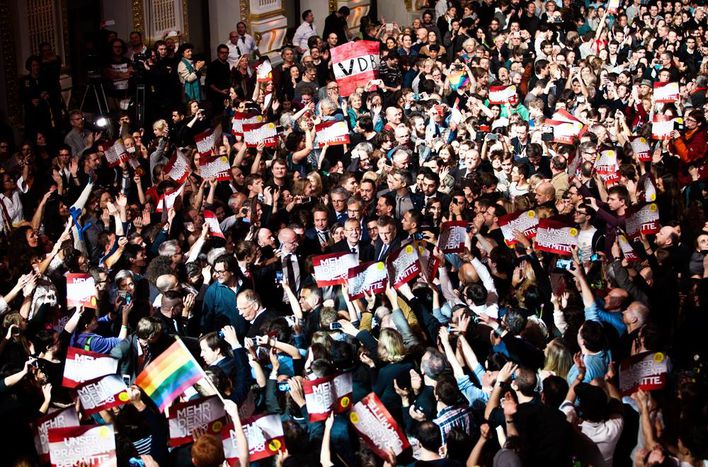
The divide in Austria will only get wider
Published on
Translation by:
Hannah J SpencerFormer Green leader Alexander Van der Bellen emerged with a narrow victory of 53.3% against the right-wing candidate Norbert Hofer in Austria's presidential elections on 4 December. Wolfgang Glass, a political theorist from Vienna, said the election suffered from "far too much ideological babble." [OPINION]
In January 2016, nobody could have imagined a presidential runoff vote between an independent candidate (Norbert Hofer, FPÖ) and a Green candidate (Alexander Van der Bellen) where both would have an equal chance of victory. The mainstream media bosses and political forecasters have to acknowledge that there is a substantial group of people who reside in a digital reality and on whom they will have no influence. Those opinionated people who once gathered around their regular table at the local pub are now using the internet for their outlet, with social media bots acting as amplifiers. The human touch is disappearing, leaving space for machines to produce false news on an industrial scale. The best example of this is perhaps the USA presidential election campaign, which was pushed along by a fake news hub based in Macedonia. A basic knowledge of programming is enough to be able to put together a social media bot.
So is the internet a danger to democracy?
If one doesn’t make sure the general population has a basic level of social media literacy, then probably. But social media can also be an opportunity for democracy, as long as we go about it seriously and both appreciate and address technology and media concerns seriously. It gets us nowhere in this day and age when champagne socialists say that it’s good that the "working classes" can talk with unwashed mouths, but cry for soap at the sight of each curse word on the internet and label it hate speech.
It’s no use riding into battle on a moral high-horse against the things that don’t fit into your worldview. If someone puts questions forward with a strategic or political agenda in order to denote vilifying positions, then of course that deserves societal condemnation. If somebody wants to push for the clarification of issues out of philosophical deliberation, however, then they should be allowed to ask without fear.
Change does good. Nobody could honestly believe that everything should stay exactly how it was back in the "good old days", back when "common sense" (rather a mere reflection of the prejudices of the time) was still common. Unfettered discussion about the problems and worries that come with change is a necessity; things aren’t always positive or comprehensible for the everyday John and Jane.
The divide will only become greater
There is a growing pattern across Europe of regional rebellions against self-proclaimed city vanguards, who potter about in air-conditioned offices far removed from their constituents. But the people are not merely taxpayers. More and more people are feeling forgotten. If the Byzantine engineering of the state apparatus (i.e. administrative reforms) doesn’t considerably change, standards won’t be sustained. It will lead to clashes between old and young, parents and the childless, cities and villages, migrants and nationals.
The bilateral worship of presidential candidates has nothing to do with the problems of the future. Terminologies are thrown about so that the interested observer becomes afraid. There is talk of another possible Nazi invasion and "the establishment" who we need to get our own back against; there is heated debate and defamation of respective opponents, either in part or until they are beyond all recognition.
Empty chatter on both sides of the debate
With that said, there have been intelligent contributions from the Court of Auditors which serve as food for thought. A "Convention of Austria", for example, held session from 2003 and 2005 and resulted in many interesting ideas for reconfigurating the future, instead of rehashing the same old left-wing/right-wing schemata. If we keep sensationalising the challenges of modern-day society instead of facing up to them, we will go from being a people to being a population. As a people, we at least – to a certain degree – share moral values and agree on a compromise: something ever so important in a democracy. In a population, you live next to each other and don’t really have to have anything in common – like a hamlet, except an indiscriminate cluster of people rather than houses.
In the vote for the new President of Austria, there was too much ethos and pathos wafting in the air: far too much quasi-ideological babble, with barely any output. The major challenges lying and waiting in the future have, once again, sadly become a side issue.
Translated from Österreich: Die Kluft wird größer werden



